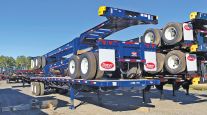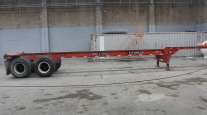Two New Chassis Pool Options May Offer Relief to Drayage Carriers With Equipment Problems
This story appears in the Jan. 16 print edition of Transport Topics.
Two new chassis pool options are emerging for drayage carriers that have been struggling with equipment issues since ocean lines began in 2009 to back away from providing chassis free-of-charge for moving international containers.
One option being evaluated by the Intermodal Motor Carriers Conference of American Trucking Associations is a trucker-owned pool to provide the equipment, executive director Curtis Whalen told Transport Topics. At the same time, an existing pool owned by ocean carriers is pursuing plans to add truckers, shippers and others as members after a federal agency recently cleared that action.
The traditional chassis supply approach began to change when Maersk Line, the world’s largest container carrier, initiated a daily chassis-use fee. Some steamship competitors followed Maersk’s lead, while others stopped supplying chassis at all. To further complicate matters, other lines kept offering chassis at no charge, and some channeled their equipment into new chassis pools.
Whalen told TT that the traditional ocean carrier approach “is being replaced by an increasingly complex mix of purchases, leases and pooling arrangements that has not produced a superior chassis supply model.”
“The current situation is giving us heartburn,” Whalen said.
Because of the increasing complications, the result is that “nobody knows what they are doing yet with chassis,” said Kevin Lhotak, president of drayage carrier Reliable Transportation Specialists and an IMCC board member.
Meanwhile, the Consolidated Chassis Management pool is seeking new members from the trucking and shipper communities, said President Phil Wojcik, whose pool has 125,000 chassis.
CCM’s effort began after the Federal Maritime Commission on Dec. 29 said it would allow a revision to the pool’s anti-trust exemption that previously restricted membership to its current group of 20 ocean carriers.
“The real key point is that we are opening up the [pool] membership so that it doesn’t need to be ocean carriers alone,” said Wojcik.
IMCC wants to determine the ability of a trucker-based pool to provide equipment that is safe while maximizing its utilization and flexibility, Whalen said. In addition, the study will evaluate whether a pool could “provide an efficient means for chassis purchasing, financing, distribution [and] maintenance.”
The IMCC study is being done by Tioga Group, Philadelphia, a consulting firm that also studied truck drayage practices in marine terminals. That study, financed by the National Cooperative Freight Research Program of the Transportation Research Board, found that terminal delays cost truckers $1.4 billion annually (11-28, p. 9).
“Our pool is a cooperative that passes along costs to members,” Wojcik said, based on the proportion of chassis contributed by each participant.
“Whether it is motor carrier, shipper, consignee or association, if they make a contribution of chassis, they get the benefit of the pool,” he said.
Wojcik told TT he believes that Tioga’s study will validate that the CCM pool approach is the right model for future chassis supply.
“The industry is changing,” Wojcik said, but interest remains in maintaining chassis pools because of their efficiency and cost savings compared with chassis supplied by carriers individually.
A trucker-based equipment pool would mirror the rail industry’s long-standing approach to supplying equipment to haul trailers and containers.
Major railroads own the company now known as TTX Co. and finance the business that provides more than 200,000 rail cars all carriers can use. TTX was founded in 1955 as Trailer Train.
TTX’s pool equipment can be reloaded and sent to any destination anywhere in the United States whenever a freight car becomes empty. That approach enhances efficiency by eliminating restrictions an individual freight car owner can put on equipment use.
“We need to have a professional look at the current landscape,” said Whalen, who noted that “it remains to be seen” whether a pool would be operated by IMCC or by some other entity that includes motor carriers.
“The initial decision is whether the [pool] concept is workable,” he said, adding that Tioga’s study could be done in two months.




